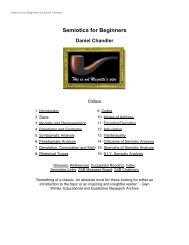Semiotics for Beginners by Daniel Chandler
Semiotics for Beginners by Daniel Chandler
Semiotics for Beginners by Daniel Chandler
You also want an ePaper? Increase the reach of your titles
YUMPU automatically turns print PDFs into web optimized ePapers that Google loves.
<strong>Semiotics</strong> <strong>for</strong> <strong>Beginners</strong> <strong>by</strong> <strong>Daniel</strong> <strong>Chandler</strong><br />
myth is not a symbol: the Negro* who salutes is not the symbol of the French<br />
Empire: he has too much presence, he appears as a rich, fully experienced,<br />
spontaneous, innocent, indisputable image. But at the same time this presence is<br />
tamed, put at a distance, made almost transparent; it recedes a little, it becomes<br />
the accomplice of a concept which comes to it fully armed, French imperiality...<br />
Myth is... defined <strong>by</strong> its intention... much more than <strong>by</strong> its literal sense... In spite of<br />
this, its intention is somehow frozen, purified, eternalized, made absent <strong>by</strong> this<br />
literal sense (The French Empire? It's just a fact: look at this good Negro* who<br />
salutes like one of our own boys). This constituent ambiguity... has two<br />
consequences <strong>for</strong> the signification, which hence<strong>for</strong>th appears both like a<br />
notification and like a statement of fact... French imperiality condemns the saluting<br />
Negro* to be nothing more than an instrumental signifier, the Negro* suddenly<br />
hails me in the name of French imperiality; but at the same moment the Negro's*<br />
salute thickens, becomes vitrified, freezes into an eternal reference meant to<br />
establish French imperiality...<br />
We reach here the very principle of myth: it trans<strong>for</strong>ms history into nature... In the<br />
case of the soldier-Negro*... what is got rid of is certainly not French imperiality (on<br />
the contrary, since what must be actualized is its presence); it is the contingent,<br />
historical, in one word: fabricated, quality of colonialism. Myth does not deny<br />
things, on the contrary, its function is to talk about them; simply, it purifies them, it<br />
makes them innocent, it gives them a natural and eternal justification, it gives them<br />
a clarity which is not that of an explanation but that of a statement of fact. If I state<br />
the fact of French imperiality without explaining it, I am very near to finding that it is<br />
natural and goes without saying: I am reassured. In passing from history to nature,<br />
myth acts economically: it abolishes the complexity of human acts, it gives them<br />
the simplicity of essences, it does away with all dialectics, with any going back<br />
beyond what is immediately visible, it organizes a world which is without<br />
contradictions... Things appear to mean something <strong>by</strong> themselves...<br />
*Translator's term - not the choice of this author<br />
(Barthes 1987)<br />
Signs and codes are generated <strong>by</strong> myths and in turn serve to maintain them. Popular usage of the<br />
term 'myth' suggests that it refers to beliefs which are demonstrably false, but the semiotic use of the<br />
term does not necessarily suggest this. Myths can be seen as extended metaphors. Like metaphors,<br />
myths help us to make sense of our experiences within a culture (Lakoff & Johnson 1980, 185-6).<br />
They express and serve to organize shared ways of conceptualizing something within a culture.<br />
Semioticians in the Saussurean tradition treat the relationship between nature and culture as<br />
relatively arbitrary (Lévi-Strauss 1972, 90, 95). For Barthes, myths serve the ideological function of<br />
naturalization (Barthes 1977, 45-6). Their function is to naturalize the cultural - in other words, to<br />
make dominant cultural and historical values, attitudes and beliefs seem entirely 'natural', 'normal',<br />
self-evident, timeless, obvious 'common-sense' - and thus objective and 'true' reflections of 'the way




